Fr. Thomas Joseph White, OP, of the Angelicum and the Thomistic Institute published a reading reading list. We need to feed our intellect. Keep on reading –faith and reason, friends….
Category: Books
Advent of the Heart
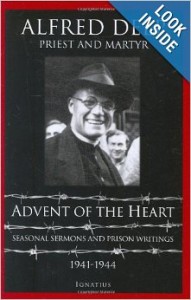 If you are looking for spiritual reading for Advent, but dare I say, for life, I would recommend a book by Jesuit Father Alfred Delp, Advent of the Heart: Season Sermons and Prison Writings, 1941-1944 (Ignatius Press, 2006).
If you are looking for spiritual reading for Advent, but dare I say, for life, I would recommend a book by Jesuit Father Alfred Delp, Advent of the Heart: Season Sermons and Prison Writings, 1941-1944 (Ignatius Press, 2006).
Spiritual reading expands the mind and the heart; it challenges our sense of complacency and comfort; spiritual reading pushes back the boundaries of ignorance.
Born in 1907, Alfred Delp was a baptized Catholic and raised in the Lutheran community until he was 14 when he reverted to the practice of Catholic faith. He joined the Society of Jesus in 1926 and ordained a priest in 1937. The Society missioned Delp to work as an editor and then as a pastor of souls.
Father Delp was an outspoken critic of the Nazi regime and a leader in the Resistance movement. The powers that be accused Delp of conspiring against the Nazi party –he was tortured, imprisoned, and executed on February 2, 1945.
Advent of the Heart contains some his meditations from prison during the Advent season as well as his sermons he gave on the season of Advent at his parish in Munich.
The publisher writes,
His [Delp’s] approach to Advent, the season that prepares us for Christmas, is what Fr. Delp called an “Advent of the heart.” More than just preparing us for Christmas, it is a spiritual program, a way of life. He proclaimed that our personal, social and historical circumstances, even suffering, offer us entry into the true Advent, our personal journey toward a meeting and dialogue with God. Indeed, his own life, and great sufferings, illustrated the true Advent he preached and wrote about.
From his very prison cell he presented a timeless spiritual message, and in an extreme situation, his deep faith gave him the courage to draw closer to God, and to witness to the truth even at the cost of his own life. These meditations will challenge and inspire all Christians to embark upon that same spiritual journey toward union with God, a journey that will transform our lives.
Atchison Blue: A Search for Silence, a Spiritual Home and Living Faith
 Judith Valente’s Atchison Blue: A Search for Silence, a Spiritual Home and Living Faith (Ave Maria Press, 2013) is a spiritual memoir noting her pilgrimage points to Mount St. Scholastica monastery in Atchison, Kansas. As many of us Ms Valente is in search of God, meaning, encouragement in the faith, and spiritual healing in a world where these things are hit-and-miss. We desire at the deepest level freedom and a stability of heart. Atchison Blue is about our eternal destiny (Cf. the Rule of Benedict); the book’s value is to help us recognize where we have met Christ, where we meet Christ, through the lens of the ancient and ever new Benedictine charism as it is rooted Rule of St Benedict. The Rule orients the process of becoming more human and a faithful disciple of the Lord.
Judith Valente’s Atchison Blue: A Search for Silence, a Spiritual Home and Living Faith (Ave Maria Press, 2013) is a spiritual memoir noting her pilgrimage points to Mount St. Scholastica monastery in Atchison, Kansas. As many of us Ms Valente is in search of God, meaning, encouragement in the faith, and spiritual healing in a world where these things are hit-and-miss. We desire at the deepest level freedom and a stability of heart. Atchison Blue is about our eternal destiny (Cf. the Rule of Benedict); the book’s value is to help us recognize where we have met Christ, where we meet Christ, through the lens of the ancient and ever new Benedictine charism as it is rooted Rule of St Benedict. The Rule orients the process of becoming more human and a faithful disciple of the Lord.
If you have ever been to a monastery to pray the Divine Office or to spend time as guest you will likely be struck by several things you find absent in the world: order, holiness, courage, zeal, patience, silence, the desire for an honest search, the willingness to cultivate a life of virtue, facing reality as it is (and not as we want it to be) and conversion of mind and heart. We know these in contrast to the substance of the way we live: freneticism, addiction, noise, curt speech, bits of anger, pride, and a divided tongue and heart.
Atchison Blue is about the spiritual and human process with ears of the heart open. That is, when we speak of the process of searching for God means that we engage in an evaluation of life, a judgment of what we experience, an examination of how sin and grace lead us: we are not exempt from the hard work of conversion if we belong to Jesus Christ. Valente goes to the heart of the Church by going to a group of women, Benedictines who take their spiritual life seriously and desire to be people fully alive. Being fully alive is the way we know grace is at work in our life. We are attracted by a presence and the sisters make this presence recognizable. The title ‘Atchison blue’ is a reference to the color blue in the windows of the chapel of Mount Saint Scholastica Monastery in Atchison where the author spent time in contemplation.
 Judith Valente is a Benedictine Oblate, poet, reporter; she and her husband live in the Chicago area. Valente’s professional work is reporting on religion for Religion & Ethics NewsWeekly and other PBS works. She’s a former staff writer of The Washington Post and The Wall Street Journal and a 1992 Pulitzer Prize finalist.
Judith Valente is a Benedictine Oblate, poet, reporter; she and her husband live in the Chicago area. Valente’s professional work is reporting on religion for Religion & Ethics NewsWeekly and other PBS works. She’s a former staff writer of The Washington Post and The Wall Street Journal and a 1992 Pulitzer Prize finalist.
Benedictine wisdom is attractive for Valente and she is attempting to make this wisdom accessible for the laity. She is neither romantic nor critical. Atchison Blue is based on relationships and not abstractions. If you want to understand the contours of your own spiritual life then read in a sensitive way Judith Valente’s Atchison Blue.
Vist Ms Valent’s website.
Rebuilt: Awakening the Faithful, Reaching the Lost, and Making Church Matter
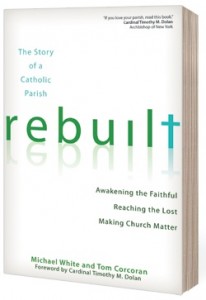 I’ve mentioned a recently published book, Rebuilt: Awakening the Faithful, Reaching the Lost, and Making Church Matter by Father Michael White and Tom Corcoran. I am in the process of digesting the content of the book. I find it helpful, realistic and spot-on in many ways. AND, I am persuaded by the indications of the authors based on their own parish experience and expectations. Obviously, you can read the book and see your parish, school, religious order/monastery in what White/Corcoran say. They don’t pretend to have all the answers and nor do they think that their method of rebuilding the parish is going to work everywhere. In fact, their method is not applicable in many Catholic institutions. What the authors offer is a possible (hopeful?) lens and a reasonable path forward in what the Lord means by the seeking the hundredfold. Their questions and concrete experiences are hard-hitting and I think are meant to make substantial change from consumer Catholics to disciples of the Lord. I think the honesty and keen observations of White and Corcoran will help to evaluate and to ask the right questions.
I’ve mentioned a recently published book, Rebuilt: Awakening the Faithful, Reaching the Lost, and Making Church Matter by Father Michael White and Tom Corcoran. I am in the process of digesting the content of the book. I find it helpful, realistic and spot-on in many ways. AND, I am persuaded by the indications of the authors based on their own parish experience and expectations. Obviously, you can read the book and see your parish, school, religious order/monastery in what White/Corcoran say. They don’t pretend to have all the answers and nor do they think that their method of rebuilding the parish is going to work everywhere. In fact, their method is not applicable in many Catholic institutions. What the authors offer is a possible (hopeful?) lens and a reasonable path forward in what the Lord means by the seeking the hundredfold. Their questions and concrete experiences are hard-hitting and I think are meant to make substantial change from consumer Catholics to disciples of the Lord. I think the honesty and keen observations of White and Corcoran will help to evaluate and to ask the right questions.
As Catholics we want to be students of the Lord, to be disciples (Matt 22 and Matt 28); we neither want Catholics to be consumers nor to passive in the journey of faith, of building up of the Kingdom and confessing the central fact of faith that Jesus Christ is Lord. In other words, we are meant to be mature, that is, adult Christians per Saint Paul the Apostle.
If we continue in a “Catholic” consumer mentality we as a Church will be become even more irrelevant than we already are in some places in the world, even in the USA. Does salvation matter? Does living as we are meant to live, that is, as a happy, healthy and mature Catholic man or woman? Does Church matter? Does my religious order or monastery matter?
It is clear that White and Corcoran are enamored by the Protestant mega-church experience. There is much to appreciate about these mega-churches on the levels of statists, programming and personal engagement. But it must be said that this approach is not going to be sufficient for Catholics if there is no correspondence with Catholic sacraments and sacramentality, lectio divina, solid catechetics for children, youth and adults and a cultures of service and study. For example, I would be suspicious of any Catholic renewal without Eucharistic and Marian devotions and no intellectual and spiritual formation. Hence, there has to be a vigorous liturgical observance. To do otherwise is a truly ecclesial contraception.
I recommend reading Rebuilt with the following texts as material for an examination of conscience of self, and for those involved in parish/religious ministries:
+ John Paul II, Christifidelis laici
+ George Weigel, Evangelical Catholicism
+ Pope Benedict XVI’s weekly catechetical addresses, the Year of Faith addresses, and his three encyclicals.
Sit before the Blessed Sacrament in prayer, examine your way of proceeding, AND listen to colleagues and with various constituencies. Focus on your concrete experience. The parish/religious order is not an island unto itself; a parish/religious order is really a vital collaborator with someone greater (God) and with others, Catholics and non-Catholics alike. To allow a parish to become irrelevant and later die because of inactivity is criminal and sinful. Ask the Holy Spirit.
To live your faith in a more mature way, then I would get a copy of Rebuilt.
More resources are found here given by the authors.
A radio review of the book can be found here.
Lights From the East, Pray For Us!
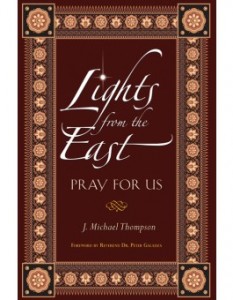 James Michael Thompson has a new book, Lights From the East, Pray For Us! This is his second.
James Michael Thompson has a new book, Lights From the East, Pray For Us! This is his second.
Published by Liguori Publications, so pre-order now.
The book provides a brief biography, a scripture reading, a reflection, a prayer, and a hymn for fifteen saints from the Eastern Churches. Lights From the East presents the Church’s incredible riches of some of the saints to English speakers, by giving the reader icons, biographies, Scripture, reflections, translated quotations from the service that honors the saint, prayers, and original hymns set to Rusyn or Galician melodies.
Thompson covers saints of the Old and New Testaments, Prophet Daniel and the Three Holy Youths, the First-Martyr and Equal-to-the-Apostles Thecla, Martyr Barbara, Macrina the Younger, Sabbas, Xenophon & Mary, and their sons, Arcadius & John, Cyril & Methodius, Theodosius of the Monastery of the Caves in Kiev, David of Thessalonica, Maximus the Confessor John Chrysostom, John of Damascus, Martyrs of the Twentieth Century.
The forward is by the Rev. Dr. Peter Galadza of the Sheptytsky Institue for Eastern Christian Studies.
J. Michael Thompson of Pittsburgh is a well-known choral director, liturgical scholar and practioner. One of his major works has been the Schola Cantorum of St. Peter the Apostle of which he is the founder and artistic director. Thompson has served as professor of ecclesiastical chant at the Byzantine Catholic Seminary of Saints Cyril and Methodius in Pittsburgh and was the cantor/ director of music at the Byzantine Catholic Cathedral of Saint John the Baptist in Munhall, Pennsylvania.
Becoming Human: Meditations on Christian Anthropology in Word and Image
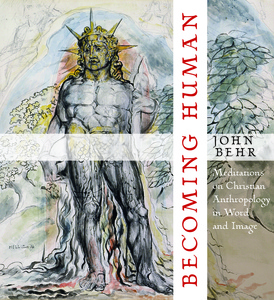 Orthodox theologian John Behr recently published Becoming Human: Meditations on Christian Anthropology in Word and Image (St Vladimir’s Seminary Press, 2013).
Orthodox theologian John Behr recently published Becoming Human: Meditations on Christian Anthropology in Word and Image (St Vladimir’s Seminary Press, 2013).
Being human is what we are created to be. Those of us with flesh and blood, body and soul, are not angels. Christians come at the question of anthropology differently. And it is a true statement that as many ecclesial communities in the world there a way of understanding the nature and beauty of what it means to be a human being.
What this book provides is a good complement to a greater theological perspective of humanity. You can read Behr together with Benedict XVI and John Paul II. Behr helps to identify a path and not a destination; the author’s method is one which looks at our ecclesial experience. We are always in process, never a finished project. Hence, Becoming Human is a healthy theological meditation, that is, he’s not giving a stale presentation of human nature is dynamic, we are in the process of becoming, and not finished when at a given point in our personal history. That is, until we die. Becoming Human is accessible and is graced by 41 color plates.
Father John Behr, a priest of the Orthodox Church in America, a patristics scholar and dean of St Vladimir’s Seminary (Yonkers, NY). Behr authored The Way to Nicaea, The Nicene Faith and The Mystery of Christ: Life in Death, all available from SVS Press.
Pope Francis: Keys to His Thought
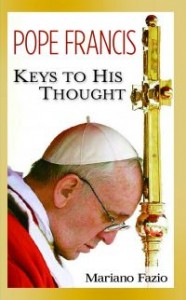 Many of thee books I read or glanced at over the recent six months have not been too helpful in understanding the newly elected Pope, Francis. A recent publication, Pope Francis: Key to His Thought, has promise. Penned by Monsignor Mariano Fazio, Vicar of the Prelature of Opus Dei in Argentina since 2010, begins the substance of his narrative when he first met Jorge Mario Cardinal Bergoglio in Rome in 2000. Fazio was then working at the Pontifical University of the Holy Cross; he was rector there from 2002-2008.
Many of thee books I read or glanced at over the recent six months have not been too helpful in understanding the newly elected Pope, Francis. A recent publication, Pope Francis: Key to His Thought, has promise. Penned by Monsignor Mariano Fazio, Vicar of the Prelature of Opus Dei in Argentina since 2010, begins the substance of his narrative when he first met Jorge Mario Cardinal Bergoglio in Rome in 2000. Fazio was then working at the Pontifical University of the Holy Cross; he was rector there from 2002-2008.
The author’s thesis is based on many friendly meetings with Francis and thus sketches in a lively manner some of the key ideas that are fundamental in knowing who the Pope is as a person and as a shepherd. I think this perspective opens wider the door of our opinion of the new pope and hopefully engenders in us a spirit of greater collaboration based on something concrete versus the media hype that is prevalent these days.
Monsignor Fazio’s text covers Francis’ “urgency to defend human life and marriage, and the need to ‘go out to the periphery’ to meet people where they are. The latter concern is reflected in the strong encouragement given by Cardinal Bergoglio to the so-called “shantytown priests” for the envangelization of the poorest neighborhoods in Buenos Aires. This effort was grounded on sacramental catechesis and educational projects that foster human dignity, and was never to be confused, Bergoglio always insisted, with an overly political ‘liberation theology.'”
As Fazio says, “I have three letters he sent me in recent years. Whenever I sent him anything, he would respond in writing, in his own hand. The format was always the same: a large card with an image of La Virgen Desatanudos (Our Lady Undoer of Knots), a title originating in Augsburg, Germany (Maria Knotenlöserin) that he had made known in Buenos Aires . . . In the blank space he writes in small letters, much like Benedict XVI, a few personal and affectionate lines. Here are some: ‘I wish you a holy and happy Christmas. May Jesus bless you and our Lady take care of you. And, please, I ask that you pray and have others pray for me’ . . . These notecards were always accompanied by two holy pictures: one of St. Joseph and the other of St. Therese of the Child Jesus, saints to whom he had great devotion . . . On the back of the picture of St. Joseph is the famous text of St. Teresa of Jesus about the efficacy of devotion to the Holy Patriarch. On various occasions when, having spoken with him, I asked for his blessing, he always invoked these saints and in addition placed me under the protection of St. Josemaria.”
Pope Francis: Keys to His Thought is available from Scepter Publishers.
The lay person’s true calling
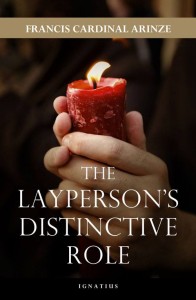 “The Christian should be a credible witness… He should work to make the culture one in which he can comfortably live and express his faith. And the person best placed to do this is not the cleric or the religious but the layperson.”
“The Christian should be a credible witness… He should work to make the culture one in which he can comfortably live and express his faith. And the person best placed to do this is not the cleric or the religious but the layperson.”
Francis Cardinal Arinze
The Layperson’s Distinctive Role
Order from Ignatius Press
Oakes on nature and grace
Just finished reading and editing a terrific and challenging book on nature and grace yet to be published by my friend Jesuit Father Ed Oakes. It is tentatively titled, The Candle Within: A Theology of Grace as Seen Through Six Controversies (expected from CUA Press). Oakes is writing this text as a seminary and university text. The Candle Within is likely to be his last significant work, save an essay, since he is battling pancreatic and liver cancer.
Our Lady of Lourdes, pray for Edward.
Servant of God Father Augustus Tolten, pray for Edward.
Late summer reading
 Just in case you’re looking for something to read this summer (what’s left of it) …
Just in case you’re looking for something to read this summer (what’s left of it) …
Francesca Ambrogetti and Sergio Rubin, Pope Francis: His Life in His Own Words
Father Robert Barron The Strangest Way: Walking the Christian Path
Pope Benedict XVI, What It Means to Be A Christian
Father Peter John Cameron, O.P., Praying with Saint Mark’s Gospel: Daily Reflections on the Gospel of St. Mark
Mary Eberstadt, Adam and Eve After the Pill: Paradoxes of the Sexual Revolution (Ignatius Press, 2013).
Father Michael Gaitley, MIC, The ‘One Thing’ Is Three
Father Reginald Garrigou-Lagrange, The Three Conversions in the Christian Life
Father John Hugo, Weapons of the Spirit (Dorothy Day retreat master)
Ralph Martin, The Fulfillment of All Desire
Barnabas Senecal, OSB, Beauty in Faces & Places (NP, 2012).
Girgis Shrif, Ryan T. Anderson, and Robert P. George, What is Marriage?: Man and Woman: A Defense (Encounter Books 2012).